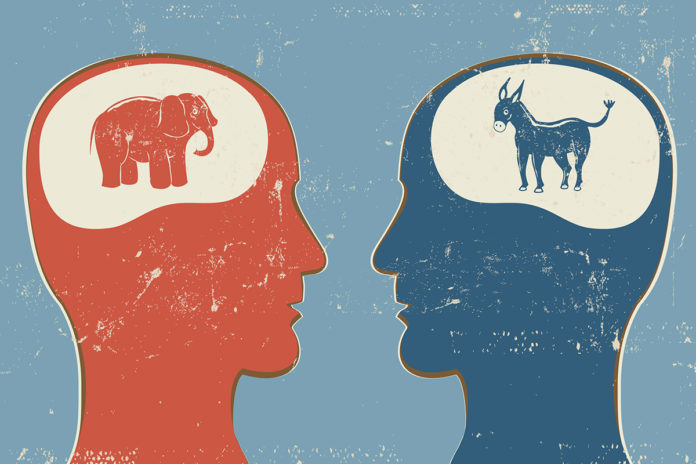
We know that our country is made up of 50 states and over 300 million people, spread out across 3.8 million square miles, all with conflicting interests. It should come as no surprise that the growing field of diverse political interests in our country cannot be adequately partitioned between two dominant political groups.
Many politicians from both sides have made the case that Washington is broken for a number of reasons, but the popular podcast site Freakonomics asks the question: What if Washington is actually doing exactly what it’s designed to do? What if they’re just selling and we’re buying? Is the dichotomy between Republicans and Democrats really that dissimilar from the dichotomy between, say, Coke and Pepsi?
For Coke and Pepsi, even though there’s this fierce conflict and competition between them, being two halves of the same duopoly has actually been mutually beneficial. These two companies get to essentially shape the rules of their market on a huge scale, and reap the rewards of self-perpetuation. Freakonomics makes the case that Republicans and Democrats are actually engaged in a duopoly that is very similar to that of Coke and Pepsi.
Economics theorist Michael Porter’s five forces of competition are what economics scholars generally agree help determine how competitive an industry is. Those five forces are the threat of new entrants, the threat of substitute products or services, the bargaining power of suppliers, the bargaining power of buyers and rivalry between existing competitors.
Porter’s theory also tells us that industries where these forces are strong offer worse prospects for long-run profitability. So it makes sense that our political apparatus would seek to weaken these forces within the political industry to increase long-term profitability, with profitability in this case being in the form of not just money, but power and influence as well.
Porter expanded on how his theory could be applied to the political world.
“We always thought of politics as a public institution,” he said, “that the rules were somehow codified in the rule of law and in our Constitution. But what we came to see is that politics is really about competition between largely private actors. And these actors are — at the core of it — what we call the duopoly.”
To be clear, there would be nothing inherently wrong with the government favoring conditions that maximize benefits for itself, so long as it wasn’t doing any damage. But that doesn’t seem to be the case.
Dr. Lee Drutman, a Johns Hopkins University political science lecturer, wrote in a Foreign Policy publication that “a divided two-party system makes effective governing difficult under any political system but almost impossible given U.S. governing institutions, by sacrificing the flexibility of officials to party discipline.”
A political system dominated by two parties is something our founding fathers often warned against. John Adams once wrote that “a division of the Republick [sic] into two great Parties… is to be dreaded as the greatest political evil.” Partisan politics is also something that George Washington warned about in his final farewell address.
But one of the most revealing measures of how an industry is performing is, arguably, the satisfaction of consumers, or, in this case, constituents. In a 2019 Pew Research publication, 75% of Americans reported that their trust in the federal government was shrinking. Pew Research also reported that trust in the federal government had been sitting at historic lows for over 15 years now.
Now some might argue here that correlation does not equal causation; that just because we are in the midst of historic lows in government trust and are sinking deeper into duopoly at the same time, doesn’t mean one caused the other, and they would be correct. There is no evidence in these statistics that the two-party duopoly is directly responsible for our lack of trust in the federal government. But regardless of the reasons underscoring this lack of trust, promoting a pluralistic system of parties which is inclusive of a broader spectrum of the political views that exist within our country seems poised to correct it if we allow.
The United States suffers from several major problems within its political apparatus: hyper-partisanship, legislative dysfunction, lack of competitiveness and a lack of trust and satisfaction in the political “product” by the people. So, what if we could solve all these problems with one easy solution?
America would not be the first country to adopt a system with pluralistic party dynamics. In France and Germany, for example, the existence of a plurality of parties on a more level playing field makes inter-party coalitions a necessary part of everyday politics. In the current American political climate, it seems outlandish to imagine two or more parties both working toward the same goal more than once in a blue moon. After all, working across the aisle in U.S. politics seems entirely unnecessary to a senate majority party that wields enough power to get motions passed with no help from other parties. But what if working across the aisle became the new norm?
Past years have seen a growth in political identities that extend beyond Republicans and Democrats. Political ideological groups such as progressives, environmentalists, neoliberals, neoconservatives, libertarians and independent moderates seem to be gaining traction.
But the evolution in diversity of ideas that has taken place outside of the political system has not been totally reflected within it. After all, how often is it that someone is elected who is not either a Republican or Democrat? It’s almost as if, in the quest to capitalize on this duopoly, we have forgotten about the fundamental question of governance: who are we governing for? And, for the sake of this democratic republic, the answer to that question must always be, without exception, all of the people.
We must therefore conclude that the American people have nothing to gain by retaining a two-party duopoly. Splitting power between two parties may be great for the government, but it is not enough to represent the diverse and pluralistic views of the people. Not only will promoting a pluralistic system of parties and ideologies put us on a path toward a more adequately representative democracy, but it is the directional change we need to restore faith in our government.
For comments/questions about this story, email editor@thewhitonline.com or tweet @TheWhitOnline.




